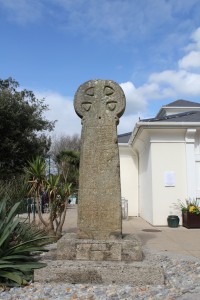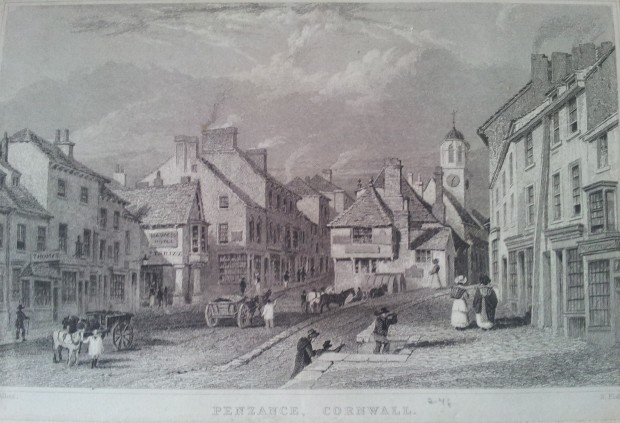Penzance should honour Lady Alice De Lisle
/2014 Year of Penzance
2014 is the Year of Penzance. Next year the town will be celebrating 400 years since it received its Charter of Incorporation (town charter) from King James I which granted it rights to govern its own affairs and hold its own courts. It will also be 200 years since the Royal Geological Society of Cornwall was founded in Penzance, then a leading centre for scientific and intellectual endeavour.
A quick look at Penzance Town Council's website suggests that the town’s origins are to be found in the fifteenth century with the grant of a market in 1404.
However this could not be further from the case.
Alice was the Mary Portas of her day
Over 80 years earlier, Lady Alice De Lisle, became Lord of the Manor of Alverton, the economic centre of Pensans (Cornish for 'holy head/headland). She inherited the manor from her rebel brother, Baron Henry Le Teys, who was executed by King Edward II in 1321.
As lord of the manor, gender was irrelevant. Alice would have had to make decisions on behalf of the entire Manor, which directly or indirectly employed much of the working population of the area. She was the head of the Chamber of Commerce and Mayor rolled into one.
She was a Mary Portas of her day.
Why were medieval markets important?
Medieval markets were not like the farmer’s markets of today. They were the high streets, town centres and retail parks rolled into one. They were where profits and losses were made and deals were struck. It was a chance for traders to check out the competition and measure their prosperity.
Villages and towns that wanted or needed a permanent market had to get permission from the monarch in the form of a grant. This grant, if accepted, was written up into a charter.
In ten years, Alice oversaw the growth of Penzance from a manor and small fishing village into a major urban centre with a commercially viable port that now needed a permanent market. In 1876, antiquarian and historian George Bown Millett said:
…let all Penzance do honour to her memory, for she was our lady patroness, and used her influence successfully in behalf of the town, at an early period of its history.
In 1332 Alice De Lisle changed the course of Penzance’s history forever.
Alice's petition to the King, 1332
Alice petitioned King Edward III for a permanent weekly market to be held on a Wednesday and an annual seven-day fair starting on the festival of St. Peter in Chains (1 August).
Alice was granted her petition and a charter was awarded.
Penzance's first market charter
The document is now held by the National Archives in London (TNA C53/119), formerly the Public Record Office. It is dated 25 April 1332 and was written in Latin. It was granted by King Edward III while he held court in Nottingham.
“Know that we of our special grace have given and have confirmed by this our Charter to our beloved Alice who was wife of Warin de Insula [de Lisle] that she and her heirs may have for ever one market every week on Wednesday at her manor of Pensans in the County of Cornwall and one fair there every year lasting for seven days namely on the Eve and Day of St. Peter ad Vincula and for five days next following.” (reproduced from P.A.S. Pool's History of Penzance, p. 211)
This is really Penzance’s earliest notable historic document and it is this award that Penzance should be celebrating.
The importance of Alice's market charter
Without Alice’s petition, the 1404 grant, which just confirmed Alice’s charter of 1332, would not have been made. Still less would we have been granted the 1614 town charter. And without that Penzance would not have become one of Cornwall’s major coinage towns in 1663.
Penzance’s later fame as a major centre of industry, commerce and banking, and as an intellectual and scientific centre, could never have happened.
In fact, Penzance as we know it may not have existed at all.
It is sad that the Town Council has not even mentioned Alice in their history of the Town Charter.
How should we honour Alice?
We don't know much about Alice herself, nor what she looked like. We have to use our imagination for that.
What we do know about her deeds in Penzance is pieced together from medieval documents on the Manor of Alverton, some of which are held in Cornwall while others are held elsewhere such as at Berkeley Castle in Gloucestershire. There is a small amount of evidence about the Teys family into which she was born, and about the De Lisles. Her descendants continued as lords of Alverton until the fifteenth century.
We think the centre of the manor was situated on Alverton Farm, now where the Lariggan stream crosses the road to Land's End.
Perhaps this was where Penzance's Market Cross, now in Penlee Park, once stood, before it was moved to Greenmarket on Alverton Street?
We would like to see Alice De Lisle honoured and her role as the patroness of Penzance officially recognised by the town authorities. We should celebrate her achievement during the 2014 Charter celebrations.
Should it be a statue? Should we make a commemorative tapestry? A plaque on St John's Hall, perhaps? Or rename a street, a pub? Maybe a local school or college could name a classroom after her? Should we institute a Penzance Alice Day during Golowan or Penzance Literary Festival?
Could readers suggest what form this could take?
We will be formally writing to all Penzance town councillors and Cornwall councillors to support our campaign to discuss the most appropriate ways we may honour Alice De Lisle. We believe she would be a great focus for the town in a time when there is strong feeling that Penzance is not living up to its full economic potential.
Vote for Alice!
[poll id="2"]
Support our campaign to honour Alice De Lisle.
You can also Vote in our Facebook Poll (Elizabeth Treffry Collection), or leave a comment here.
This campaign is part of the Hypatia Trust's Heritage Lottery Funded project History 51 which is documenting and sharing information on the lives of historical women in Cornwall and the Isles of Scilly.




